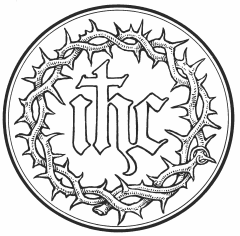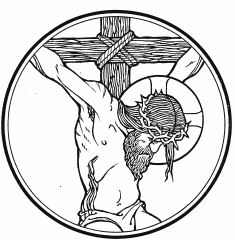 Crucifixes make us uncomfortable—and well they should. We squirm before them, and it has nothing to do with any anti-Catholic bias. It is simply painful to look upon our Lord suffering so and to know the reason for His suffering. We shudder before it. In the darkness of that Good Friday, the totality of human sin—from the first sin of our first parents to the last sin of the last human being alive—all of it was gathered up, pressed together, and then off-loaded onto this Man. He bore the whole weight of it and owned it as His own. Thus He also bore its penalty—both temporal and eternal death.
Crucifixes make us uncomfortable—and well they should. We squirm before them, and it has nothing to do with any anti-Catholic bias. It is simply painful to look upon our Lord suffering so and to know the reason for His suffering. We shudder before it. In the darkness of that Good Friday, the totality of human sin—from the first sin of our first parents to the last sin of the last human being alive—all of it was gathered up, pressed together, and then off-loaded onto this Man. He bore the whole weight of it and owned it as His own. Thus He also bore its penalty—both temporal and eternal death.
Look upon His cross. See His wounds, the nails affixing His hands and feet to the beams. See the blood running down His face from the thorns. Behold the quivering mass of His mutilated back as He is forced to rub it against the tree, pushing up against the nails to take in a breath of air. Look, seek, and realize: this wounded Man, dying in agony, is not suffering for a single wrong that He has done. As we have seen, His whole life was only love. He was the only human being who completely loved the Father with His all and His neighbor as Himself. Yet it is because He is love that He is now upon the tree. Love will not leave the sinner in his sin. Love takes that sin upon Himself. Love is wounded to grant us healing. He is offering atonement for all the wrongs that we have done. Yes, it is hard to look a crucifix in the face, but it is necessary, because it is not Christ who deserves to be nailed to the cross, but instead it should be us.
While we should be the ones nailed to the cross, it is impossible for us to be the one to hang upon it. Because of our sinful nature, our death on the cross would mean nothing, for there is nothing about us that can redeem ourselves from the clutches of death. The only way for our sin to be purged is by the death of Jesus Christ, the Lamb of God who takes away the sin of the world. And so tonight, we deal with death up close and personal. We do not stand beside a casket of a parent or another family member; instead, we stand at the foot of the cross of Jesus Christ, our Savior. We experience the reality of death, His death. We realize that death does indeed come close – to each of us. Death is the enemy. It would be cold and dark and empty, except that Jesus has come close to us and has faced death in our place.
Though Christ has faced death in our place, it does not mean that we are immune to the effects of death. To live in this world means that we must face death. Because of Jesus, the death that we face is merely temporal and not eternal. He has seen fit to lay down His life for us, even though we are born enemies of God, He still goes to the cross on our behalf to shed His blood to make a sacrifice that is pleasing to God, one that will do what no other sacrifice could ever do: make full restitution to God for sins committed and restore creation to its rightful place with God the Father.
The prophet Isaiah painted a poetic picture of what this Friday would be. He described a Savior, a Suffering Savior, who would stand in our place and experience death up close. For us who are part of fallen humanity, death is justice. It is a verdict that fits the crime. We have disobeyed God and deserve death. But now the Suffering Savior comes near. As Isaiah describes it, “He was despised and rejected by men; a man of sorrows, and acquainted with grief…. Surely he has borne our griefs and carried our sorrows…. He was wounded for our transgressions; He was crushed for our iniquities…. The LORD has laid on him the iniquity of us all…. He was cut off out of the land of the living.”
All of this was done for you, with you in mind. Everything that He bore on the cross, He bore it for you. God the Father forsook our Lord so that you would not be forsaken by God. All of your sins, past, present, and future are nailed to the cross of Christ, because He takes them upon Himself.
Our Suffering Savior knows death up close. He felt the bite of death. He winced at the piercing of the nails. He endured the taunting of the crowd and the unjust accusations. He tasted the thirst of death. He didn’t simply view death from a casual distance. He was no simple spectator. He joined Himself to us and absorbed the blows of the hammer that should have been ours. In His death He carried our sorrows. He came to the scene of our guilt. He stretched out His hands to receive our sins. He looked death in the eye. He left nothing undone. He said, “It is finished.” All was completed; the obligation for sin paid. All was accomplished.
On this Good Friday, we stand at the foot of the cross to view a crucified Jesus. We experience death up close, the death of our Suffering Savior. That is why we train ourselves in life to look upon the crucifix, to behold our Savior’s wounds, to hold them close to our heart, counting them as the most precious treasure we have.
Because of Jesus, we can look into the eyes of death and see not a conquering villain, but an enemy that has been conquered. We can see victory in death. We can find hope in sorrow, for we have a Suffering Savior who experienced death up close and personal and overcame it. Our Lord swallowed death. He tasted it for us, and now we follow Him from death to life. Amen.

